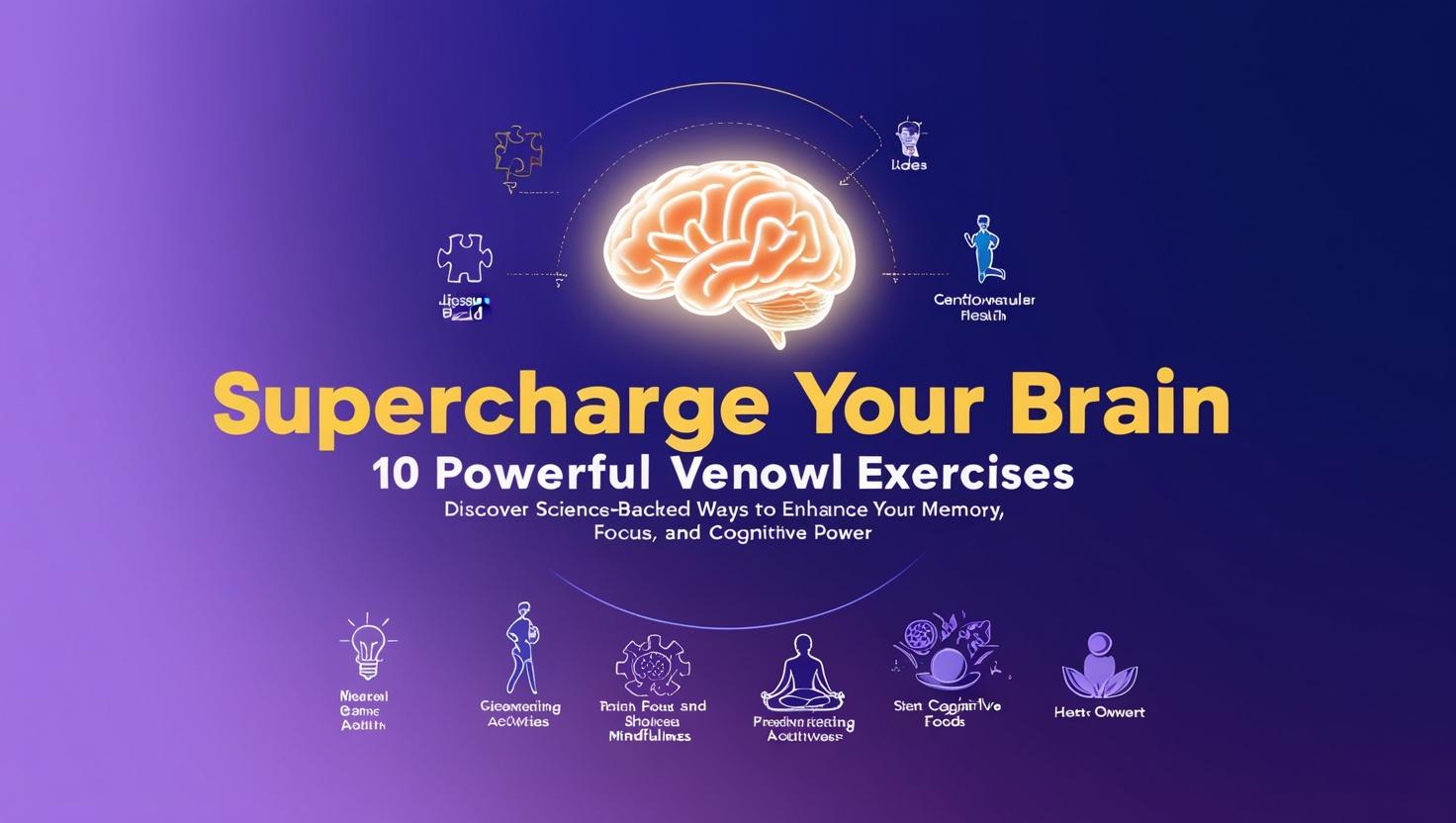Exercises to Improve Brain Function: Boost Your Cognitive Power Naturally
In today’s fast-paced world, maintaining optimal brain function is more important than ever. Whether you’re a student, a professional, or a senior, keeping your brain sharp can enhance your productivity, memory, and overall quality of life. The good news is that improving brain function doesn’t require expensive supplements or high-tech gadgets. Simple, science-backed exercises can help you boost your cognitive abilities naturally. In this article, we’ll explore effective exercises to improve brain function, backed by research and practical tips you can start today.
Why Brain Exercises Matter
The brain is like a muscle—the more you use it, the stronger it becomes. Engaging in regular mental and physical exercises can:
- Enhance memory and recall
- Improve focus and concentration
- Boost problem-solving skills
- Increase mental clarity and creativity
- Delay cognitive decline associated with aging
Let’s dive into the best exercises to achieve these benefits.
1. Mental Exercises to Stimulate Your Brain
Mental exercises are activities that challenge your brain, helping to create new neural connections and improve cognitive function.
a) Puzzles and Brain Games
Puzzles like crosswords, Sudoku, and jigsaw puzzles are excellent for stimulating the brain. They require logical thinking, pattern recognition, and problem-solving skills.
- How to Start: Dedicate 15–20 minutes daily to solving puzzles. Use apps like Lumosity or Elevate for a variety of brain games.
- Benefits: Improves memory, attention, and processing speed.
b) Learn Something New
Learning a new skill or hobby forces your brain to adapt and grow. Whether it’s playing a musical instrument, learning a new language, or mastering a craft, the process of learning strengthens neural pathways.
- How to Start: Pick a skill you’ve always wanted to learn and dedicate time to practice regularly.
- Benefits: Enhances neuroplasticity and keeps your brain agile.
c) Memory Training
Memory exercises, such as memorizing lists, names, or even poems, can significantly improve your recall abilities.
- How to Start: Try memorizing a short poem or a list of 10 items. Gradually increase the complexity.
- Benefits: Boosts short-term and long-term memory.
2. Physical Exercises for Brain Health
Physical activity is not just good for your body—it’s also crucial for your brain. Exercise increases blood flow to the brain, delivering oxygen and nutrients that enhance cognitive function.
a) Aerobic Exercises
Activities like running, swimming, cycling, and dancing are excellent for brain health. Aerobic exercises increase the production of brain-derived neurotrophic factor (BDNF), a protein that supports brain cell growth.
- How to Start: Aim for at least 30 minutes of moderate aerobic exercise, 3–5 times a week.
- Benefits: Improves memory, focus, and overall brain function.
b) Yoga and Tai Chi
These mind-body exercises combine physical movement with mindfulness, making them perfect for brain health.
- How to Start: Join a local yoga or Tai Chi class, or follow online tutorials.
- Benefits: Reduces stress, improves focus, and enhances mental clarity.
c) Strength Training
Lifting weights or doing bodyweight exercises like push-ups and squats can also benefit your brain. Strength training has been linked to improved executive function and memory.
- How to Start: Incorporate strength training into your routine 2–3 times a week.
- Benefits: Enhances cognitive flexibility and problem-solving skills.
3. Mindfulness and Meditation
Mindfulness and meditation are powerful tools for improving brain function. They help reduce stress, improve focus, and enhance emotional regulation.
a) Mindfulness Meditation
Mindfulness involves paying attention to the present moment without judgment. Regular practice can rewire your brain to improve focus and reduce anxiety.
- How to Start: Spend 10–15 minutes daily focusing on your breath or practicing guided meditation using apps like Headspace or Calm.
- Benefits: Increases gray matter in the brain, improves attention, and reduces stress.
b) Body Scan Meditation
This technique involves mentally scanning your body from head to toe, noticing any sensations or tension.
- How to Start: Lie down in a comfortable position and slowly focus on each part of your body.
- Benefits: Enhances self-awareness and reduces stress.
4. Social Interaction and Brain Health
Engaging in meaningful social interactions is another way to keep your brain sharp. Social activities stimulate the brain and can even reduce the risk of cognitive decline.
a) Join a Club or Group
Whether it’s a book club, a hobby group, or a volunteer organization, socializing with others can challenge your brain and improve emotional well-being.
- How to Start: Look for local or online groups that align with your interests.
- Benefits: Enhances communication skills and emotional intelligence.
b) Play Strategy Games
Games like chess, bridge, or even multiplayer video games require strategic thinking and social interaction.
- How to Start: Invite friends or family to play strategy games regularly.
- Benefits: Improves problem-solving skills and fosters social connections.
5. Creative Activities to Boost Brain Function
Engaging in creative activities can stimulate different parts of your brain, enhancing cognitive flexibility and innovation.
a) Drawing or Painting
Artistic activities like drawing or painting engage the brain’s visual and motor centers.
- How to Start: Dedicate time each week to create art, even if you’re a beginner.
- Benefits: Enhances creativity and reduces stress.
b) Writing
Writing, whether it’s journaling, storytelling, or poetry, activates multiple areas of the brain.
- How to Start: Write for 10–15 minutes daily about your thoughts, experiences, or creative ideas.
- Benefits: Improves communication skills and emotional expression.
6. Nutrition and Brain-Boosting Foods
While not an exercise, nutrition plays a vital role in brain health. Pair these exercises with a brain-healthy diet for maximum benefits.
- Foods to Include: Fatty fish (rich in omega-3s), blueberries, nuts, seeds, dark chocolate, and leafy greens.
- Hydration: Drink plenty of water to keep your brain functioning optimally.
7. Sleep and Brain Function
Quality sleep is essential for brain health. During sleep, the brain consolidates memories and removes toxins.
- Tips for Better Sleep: Maintain a consistent sleep schedule, avoid screens before bed, and create a relaxing bedtime routine.
- Benefits: Improves memory, focus, and overall cognitive function.
8. Daily Habits for a Healthier Brain
Incorporate these simple habits into your routine to support brain health:
- Stay Curious: Ask questions and seek out new experiences.
- Stay Organized: Use planners or apps to manage tasks and reduce mental clutter.
- Limit Multitasking: Focus on one task at a time to improve efficiency and reduce stress.
Conclusion
Improving brain function is within your reach with the right exercises and habits. By incorporating mental exercises, physical activity, mindfulness, social interaction, and creative activities into your daily routine, you can boost your cognitive abilities and enjoy a sharper, healthier mind. Remember, consistency is key—start small, stay committed, and watch your brain power soar.
Read Also:
Science of Neuroplasticity
FAQs
1. How long does it take to see results from brain exercises?
- Results vary, but many people notice improvements in focus and memory within a few weeks of consistent practice.
2. Can brain exercises prevent Alzheimer’s disease?
- While they can’t guarantee prevention, brain exercises may reduce the risk of cognitive decline and improve overall brain health.
3. Are brain-training apps effective?
- Yes, apps like Lumosity and Elevate can be effective when used consistently and combined with other brain-boosting activities.
4. How often should I do brain exercises?
- Aim for at least 20–30 minutes of brain exercises daily, along with regular physical activity and mindfulness practices.
By following these tips and exercises, you can take proactive steps to enhance your brain function and enjoy a more productive, fulfilling life. Start today and unlock your brain’s full potential!










3 thoughts on “Supercharge Your Brain: 10 Powerful Exercises to Boost Memory, Focus, and Cognitive Power”
Hi
How it is find